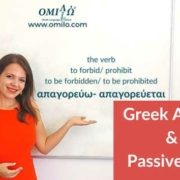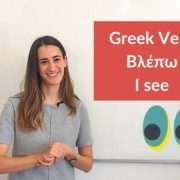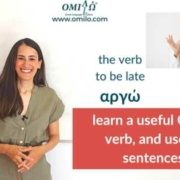Did you know you can learn Greek grammar with the Aegean Airlines commercial videο?
Let’s take a look at some perfect examples to learn the the Present Perfect in Greek.
Whether you like to fly with Aegean or not, it is time to learn some more Greek grammar and practice your Greek 🙂
Aegean Airlines Commercial Slogan
In the video, «έχω πάει» (= I have been), the commercial for Aegean Airlines Company, you can see various people talking about destinations and trips.
However, there is always a lady who keeps interrupting every person who is talking, by saying that “she’s been everywhere”.
In this way, the airline wants to show that it has such a large network of destinations that the customers can travel everywhere in the world.
The slogan «έχω πάει» means “I have been there” and it became really popular in Greece.
In general, Greeks say this a lot in everyday language too.
So «έχω πάει» (and some other verbs in the video) is actually the Present Perfect Tense.
Continue reading, and enjoy learning Greek grammar!
The video, text and translation
First, watch the video of Aegean, by clicking below
https://www.youtube.com/watch?v=b82ylwb3tP0
You can watch the video while following the transcript & and translation below.
ENGLISH TRANSLATION
1
- Για την επέτειό μας, λέμε Βαρκελώνη.
For our anniversary, we are thinking about (going to) Barcelona.
- Ολέ! Βαρκελώνη. Εγώ θα σου πω. Απίθανη πόλη, ναι. Έχω πάει.
Ole! Barcelona. I will tell you. Incredible city. I have been there.
2
- Και ξέρετε τι μας έκανε τη μεγαλύτερη εντύπωση στο Εδιμβούργο;
Do you know what impressed us the most in Edinburgh?
- Ξέρω, ξέρω. Τα 112 πάρκα. Ξέρω, ξέρω, ξέρω. Έχω πάει!
I know, I know. The 112 parks. I know! I have been there!
3
- Και μου λέει ο Σπύρος «Θα σε πάω σε ένα μέρος που δεν το ξέρει κανείς. Στο Γερεβάν».
So Spiros tells me “I will take you to a place that nobody knows. In Yerevan”.
- Γερεβάν. Γε-ρε-βαν. Έχω πάει στο Γερεβάν. Πολύ φιλόξενοι οι Αρμένιοι.
Yerevan. Ye- re- van. I have been to Yerevan. Armenians are very hospitable.
4
- Αυτό όμως δεν το έχετε ξαναδοκιμάσει. Μπουρδέ…
You have never tried this one here. Bourde…
- Μπουρδέτο! Το ‘πα πρώτη. Έχω φάει. Απ’ την Κέρκυρα. Αφού έχω πάει, έχω φάει κιόλας.
Bourdeto! I said this first. I have eaten. From Corfu. Since I have been there, I have also eaten.
5
- Λέμε το επόμενο ταξίδι μας να είναι Μαρακές.
We are thinking about our next travel to Marrakesh.
- Μαρακές. Έχω πάει… Έχω πάει;
Marrakesh. I have been there… Have I been there?
Αφού πετάμε σε τόσα μέρη, λογικό είναι κάποιοι να έχουν πάει παντού.
Since we fly to so many places, it makes sense that some people have been everywhere.
–έχω πάει, έχω πάει έχω πάει, έχω πάει…. (song)
Με το μεγαλύτερο δίκτυο προορισμών, γίνε κι εσύ ένας από αυτούς.
With the largest network of destinations, become one of them.
Teacher Myrto made her own video, based on the Aegean commercial
Click below, and watch teacher Myrto, imitating the same scenario 🙂
You will also find English subtitles in the first version, and Greek in the 2nd version, so idea to practice your listening skills
Greek grammar; How to form the Present Perfect Tense?
You conjugate the verb «έχω» and then you use the 3rd person in Singular of the Future Simple Tense (without «θα»).
See below;
(δεν) έχω + 3rd person singular of Simple Future
In this article we focus on the commercial’s verbs
- EXAMPLE 1
«έχω πάει» (I have been)
It is the verb πάω (= to go).
Future Simple ; εγώ θα πάω (I will go)
εσύ θα πας (you will go)
αυτός/ αυτή/ αυτό θα πάει (he/ she/ it will go) à You need this
so you say ; έχω πάει (I have gone/ I have been)
Let’s conjugate this verb in present perfect
εγώ έχω πάει (I have been)
εσύ έχεις πάει (you have been)
αυτός, -ή, -ό έχει πάει (he/ she/ it has been)
εμείς έχουμε πάει (we have been)
εσείς έχετε πάει (you have been)
αυτοί, -ές, -ά έχουν πάει (they have been)
CAREFUL; As you can see, you only conjugate the verb «έχω»!
+++++++++++++++++++++++++++++++++++++++++++++++++++
- EXAMPLE 2
«Αυτό όμως δεν το έχετε ξαναδοκιμάσει». (=You have not tried this before)
δοκιμάζω = to try
ξαναδοκιμάζω = to try again
Future Simple à εγώ θα ξαναδοκιμάσω (I will try again)
εσύ θα ξαναδοκιμάσεις (you will try again)
αυτός,-ή,-ό θα ξαναδοκιμάσει (he/ she/ it will try again)
so you say;
εγώ δεν έχω ξαναδοκιμάσει (I have never tried before)
εσύ δεν έχεις ξαναδοκιμάσει (you have never tried before)
αυτός, -ή, -ό δεν έχει ξαναδοκιμάσει (he/ she/ it has never tried before)
εμείς δεν έχουμε ξαναδοκιμάσει (we have never tried before)
εσείς δεν έχετε ξαναδοκιμάσει (you have never tried before)
αυτοί, -ές, -ά δεν έχουν ξαναδοκιμάσει (they have never tried before)
+++++++++++++++++++++++++++++++++++++++++++++++++++++++
- EXAMPLE 3
Έχω φάει. (=I have eaten)
τρώω = to eat
Future Simple à εγώ θα φάω (I will eat)
εσύ θα φας (you will eat)
αυτός, -ή, -ό θα φάει (he/ she/ it will eat) à You need this
so you say
εγώ έχω φάει (I have eaten)
εσύ έχεις φάει (you have eaten)
αυτός, -ή, -ό έχει φάει (he/ she/ it has eaten)
εμείς έχουμε φάει (we have eaten)
εσείς έχετε φάει (you have eaten)
αυτοί, -ές, -ά έχουν φάει (they have eaten)
How to use the Present Perfect?
- For an action that was done in the past, but you see the result now.
Η Μαρία δεν είναι όπως παλιά. Έχει αλλάξει. (αλλάζω- θα αλλάξω- έχω αλλάξει)
(Maria is not like she used to be. She has changed.)
- For an action that started in the past and hasn’t finished yet.
Έχω αρχίσει μαθήματα χορού. (αρχίζω- θα αρχίσω- έχω αρχίσει)
(I have started dance lessons.)
And the most common use (also what you see in the commercial);
- For something that happened, but we are not very interested in when exactly it happened
(unlike the Simple Past, which we use for a specific time).
You just say that you have done something, you have been somewhere etc, sometime in the past.
The sentences of the video;
- Έχω πάει. (I have been there)
- Αυτό όμως δεν το έχετε ξαναδοκιμάσει. (You have never tried this one here before)
- Μπουρδέτο! Έχω φάει. Από την Κέρκυρα. Αφού έχω πάει, έχω φάει κιόλας.
(Bourdeto! I have eaten. From Corfu. Since I have been there, I have also eaten.)
You can also say «Έχω πάει στην Ελλάδα» (I have been to Greece). (any time…)
BE CAREFUL
If you want to say something about a very specific period, you can NOT use the Present Perfect.
So if you want to say that you went to Greece last summer, you CANNOT say «Έχω πάει στην Ελλάδα πέρυσι το καλοκαίρι».
You have to say «Πέρυσι το καλοκαίρι πήγα στην Ελλάδα» (Last summer I went to Greece).
So if you talk about a specific time period, you use the Simple Past and NOT the Present Perfect.
Common expressions using Present Perfect;
(δεν) ποτέ… (ever/ never)
- Έχεις πάει ποτέ εκεί;
(Have you ever been there?)
- Δεν έχω πάει ποτέ εκεί.
(I have never been there.)
-δεν… ακόμα (not.. yet)
- Δεν έχει φτάσει ακόμα.
(He/ She hasn’t arrived yet.)
-ήδη (already)
- Έχω ήδη διαβάσει αυτό το βιβλίο./ Έχω διαβάσει ήδη αυτό το βιβλίο. / Έχω διαβάσει αυτό το βιβλίο ήδη. Ήδη έχω διαβάσει αυτό το βιβλίο.
(I have already read this book.)
–εδώ και (in, within a period)
- Δεν έχω δει την Ελένη εδώ και 3 χρόνια.
(I haven’t seen Eleni in 3 years.)
-από (since)
- Έχω αγοράσει τα βιβλία από την Παρασκευή.
(I have bought the books since Friday.)
+++++++++++++++++++++++++++++++++++++++++++++++++++++++++++++++++++++++++++++++++++++++++++++++++++
Time for practice! 😊
- Fill out the gaps below with Present Perfect. You will find the answer key at the end of the article.
- Ο Κώστας ______________ στην Ελλάδα; (γυρίζω)
- Εγώ _____________ αυτό το βιβλίο. Είναι τέλειο! (διαβάζω)
- Θα ταξιδέψω αλλά δεν _____________ ακόμα εισιτήρια. (κλείνω)
- Εμείς ____________________ ήδη τον λογαριασμό. (πληρώνω)
- “______________________ το φαγητό;” μας ρώτησε ο σερβιτόρος. (τελειώνω)
- Ο Κώστας πεινάει πολύ, αλλά δεν _________________ ακόμα. (μαγειρεύω)
- Αυτοί δεν _______________ ποτέ λάτιν. (χορεύω)
- -Θα μείνεις να φάμε;
-Όχι, ευχαριστώ. ____________ ήδη. (τρώω)
- Εγώ το _________________ πολλές φορές αυτό. (λέω)
- Το μωρό δεν ____________________ ακόμα. (ξυπνάω)
- Μαρία, δεν _____________________ ακόμα την Κατερίνα; (συναντάω)
- Ποιος _____________________ μηχανάκι; (οδηγώ)
- Ο Κώστας δεν ____________________ ακόμα. (τηλεφωνώ)
- Η Σοφία _____________________ το κάπνισμα από το 2020. (σταματάω)
- Past Simple or Present Perfect? Fill out the gaps below. You will find the answer key at the end of this article.
- Χτες δεν _________ στο πάρτι, γιατί ήμουν κουρασμένη. (πάω)
- Η Φαίη δεν ______________ ποτέ στην Αμερική. (ταξιδεύω)
- Εμείς ______________ πολύ την προηγούμενη εβδομάδα. (δουλεύω)
- Αυτοί σήμερα _______________ αργά. (ξυπνάω)
- Τα παιδιά _____________ στο σπίτι πριν από δύο λεπτά. (φτάνω)
- Εγώ __________________ το βιβλίο από την Τετάρτη. (τελειώνω)
- Μαρία, _____________________ ποτέ καραόκε; (τραγουδάω)
- Η Κατερίνα και η Νίκη δεν _______________ ποτέ σουβλάκι. (τρώω)
Answer Key
Exercise 1
- έχει γυρίσει
- έχω διαβάσει
- έχω κλείσει
- έχουμε πληρώσει
- Έχετε τελειώσει
- έχει μαγειρέψει
- έχουν χορέψει
- Έχω φάει
- έχω πει
- έχει ξυπνήσει
- έχεις συναντήσει
- έχει οδηγήσει
- έχει τηλεφωνήσει
- έχει σταματήσει
Exercise 2
- πήγα
- έχει ταξιδέψει
- δουλέψαμε
- ξύπνησαν/ ξυπνήσανε
- έφτασαν/ φτάσανε
- έχω τελειώσει
- έχεις τραγουδήσει
- έχουν φάει









